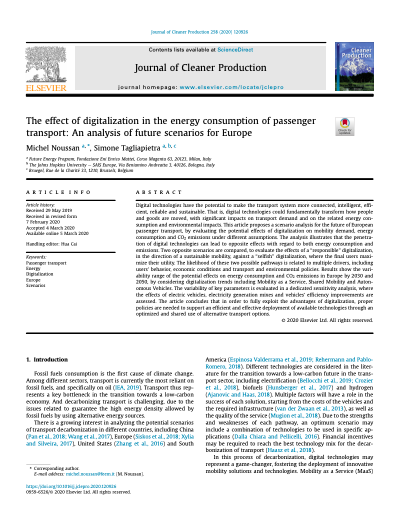External Publication
The effect of digitalization in the energy consumption of passenger transport: An analysis of future scenarios for Europe
The paper evaluates the effects on energy consumption of digitalization in transport. Digitalization needs a tailored policy support to avoid higher energy consumption.
Digital technologies have the potential to make the transport system more connected, intelligent, efficient, reliable and sustainable. That is, digital technologies could fundamentally transform how people
and goods are moved, with significant impacts on transport demand and on the related energy consumption and environmental impacts.
This article proposes a scenario analysis for the future of European
passenger transport, by evaluating the potential effects of digitalization on mobility demand, energy consumption and CO2 emissions under different assumptions.
The analysis illustrates that the penetration of digital technologies can lead to opposite effects with regard to both energy consumption and emissions. Two opposite scenarios are compared, to evaluate the effects of a “responsible” digitalization, in the direction of a sustainable mobility, against a “selfish” digitalization, where the final users maximize their utility. The likelihood of these two possible pathways is related to multiple drivers, including users’ behavior, economic conditions and transport and environmental policies.
Results show the variability range of the potential effects on energy consumption and CO2 emissions in Europe by 2030 and 2050, by considering digitalization trends including Mobility as a Service, Shared Mobility and Autonomous Vehicles. The variability of key parameters is evaluated in a dedicated sensitivity analysis, where the effects of electric vehicles, electricity generation mixes and vehicles’ efficiency improvements are assessed.
The article concludes that in order to fully exploit the advantages of digitalization, proper policies are needed to support an efficient and effective deployment of available technologies through an optimized and shared use of alternative transport options.












